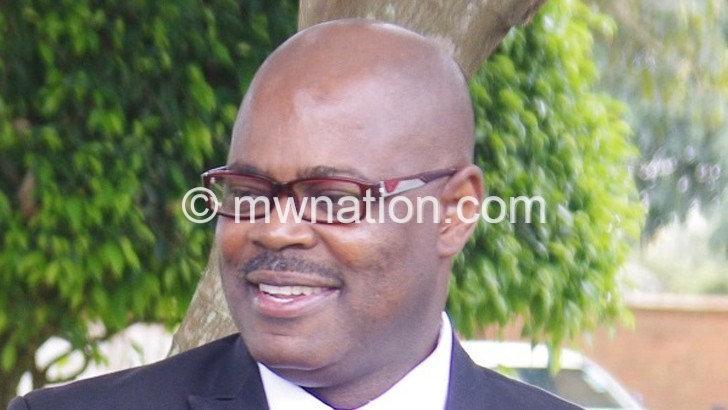‘Prince Talal award is a special gift for NRWB’
The Northern Region Water Board (NRWB) recently won the $200 000 (about K150 million) 2019 Prince Talal International Prize for Human Development for successfully implementing the $22 million (K17.1 billion) Mzimba Integrated Urban Water and Sanitation Project. The Arab Gulf Programme for Development (Agfund) annually awards the prize to encourage innovation and creativity in human development to achieve sustainability and investment in people. The Opec Fund for International Development (OFID) nominated the Board for the prize and was supported by the African Development Bank (AfDB). Our staff reporter ENELLESS NYALE engaged NRWB’s chief executive officer TITUS MTEGHA to hear about the award-winning project and how it is changing lives of communities:

Q: This is the first time a Malawian public institution has ever won the $200 000 Agfund prize since the programme’s inauguration in 1999. What does this achievement mean for Malawi in general and NRWB in particular?
A: NRWB won this award for successfully implementing the Mzimba Integrated Urban Water and Sanitation Project. We were nominated by OFID and AfDB supported the nomination. This is a high profile award which has not only put NRWB on the world map but also Malawi. There were 38 countries worldwide that submitted over 80 projects from the four categories that were there. We won in the third category meant for projects implemented by national government institutions. So this is not a mean achievement at all, it speaks volumes on our achievements and performance.
Q: Success mostly follows a combination of factors, including determination and a great deal of positive habits. How do you describe NRWB’s path to this achievement, which other parastatals and non-governmental organisations can emulate?
A: For us to realise this performance, it goes together with the leadership as an institution which is visionary and focused both at board and operational levels. I led a team of motivated staff to implement the project. Teamwork on the project management and implementation from the board, donors and government, made it easy and a successful one. On top of that the team that was charged was a team of well-trained engineers who were highly trained and well-motivated; an empowered team which was given clear goals to achieve within a specified period of time and target.
We motivated the team with incentives for them to work hard as the work they were doing was very big and beyond their salary. I personally chaired the monthly monitoring committee. I was also on the ground every month to see progress and did site visits. This project received political support as the loan was approved in Parliament and we had Parliament doing follow ups through various committees to see the progress. At the same time, the State President Peter Mutharika commissioned it.
Q: Access to safe drinking water remains one of government’s key priority areas amid drastic water shortages countrywide due to, among others, persistent impacts of climate change and varying weather patterns. What measures has NRWB put in place to develop resilient services as part of dealing with persistent dry taps among its customers?
A: We note that water sources are key for us to maintain supply, there are human activities in these catchment areas that are affecting our operations. However, we have catchment management programmes on a yearly basis where we involve communities to protect these catchments by planting trees and encouraging to do better agriculture practices that will help protect the catchment. So catchment management is the key. We also focus on reducing system loses, once we abstract, treat and distribute, not all the water reaches our customers, some of it gets lost due to leakages and illegal connections. We used to have 36 percent losses now we are at 28 percent.
We have put in place a programme to trace leaks and manage our pressures. We also introduced pre-paid meters; this is making people conscious in using water. We are raising Lunyangwa dam in Mzuzu and constructing two weirs in Ekwendeni and downstream of Lunyangwa Dam so that during dry season we should not run out of water and be able to maintain supply.
Q: How does NRWB manage its efficiency in relation to service provision and expansion of customer base when some statistics show that at least four million Malawians (or one in every three people) still lack access to safe drinking water today?
A: Our strategy is timely investment in infrastructure development. That is the only way we can reach out to more customers and increase customer base. Currently, we completed Chitipa Water supply project in 2018, and in 2019 we completed the Mzimba Integrated Urban Water and Sanitation Project, and the two projects have had 50 000 Malawians added into the network and thereby increase access to clean water. As we are speaking, we are now working on three projects namely, Nkhata Bay, Chintheche and Karonga which we expect will realise an additional 280 000 Malawians get access to clean water in a year’s time. We are meanwhile sourcing financing for Chilumba and Rumphi which will add another 50 000 people to the base.
Q: What’s your last word?
A: I am proud to be associated with this prestigious award and leading an institution which has been the first to receive such an award. I am proud that I have contributed much to put my country Malawi on the map.
I am grateful to Agfund for selecting us, out of 38 countries. I am humbled that I can be part of the winning team, we should thank OFID and AfDB for the nomination and support for this award, the same should go to government, staff, board of directors for the team work, this is a special gift for the board and the country, we are all winners on this.





